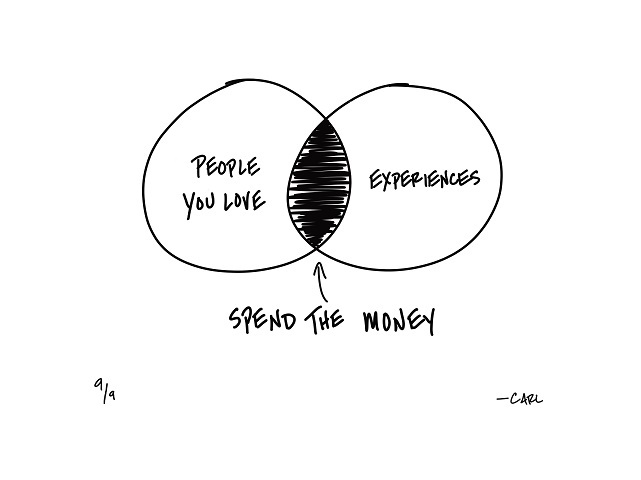The Role "Returns" Play In Your Investments And Your Life
You’re familiar with the term “return on investment” (ROI) when it comes to your money. While ROI is important for a well-balanced portfolio, other types of “returns” can impact your well-being.
Life doesn’t begin and end with money; money is simply one tool that can help you pursue your goals. Using your resources (time and money) in ways that align with your goals and values enables you to achieve your most meaningful goals and find lifelong fulfillment.
Let’s take a look at the many ways “returns” can impact both your life and your wallet.
Return on Life
At the end of the day, life isn’t about having the most zeroes in your bank account; it’s about living a fulfilling and prosperous life.
Take a step back and reflect on your life so far. Are you satisfied in your career, or is it time to consider a change? You spend 40+ hours a week working, and if it’s not satisfying, it’s a drain on your time and energy.
People want to find meaning in their work, and if they can’t, they seek new opportunities. The Great Resignation is real. The Bureau of Labor Statistics noted that more people are leaving their jobs than ever before. In fact, the national quit levels are about 3% or 4.5 million workers.
People of varying ages and skill sets are leaving their current employers searching for work that can provide more than just a paycheck. Employers are taking note, offering benefits and opportunities for work-life balance at a greater rate than ever before.
But beyond the workday, how are you spending the rest of your time? The things you do most regularly help define who you are. Are your weekends spent visiting with loved ones or exploring nature? Making the most of your free time doing what you love can help ensure you’re getting the greatest return on life possible.
Return on Relationships
The pandemic has changed so many things about us, including how we see each other. Being asked to spend time apart has only strengthened and reiterated the need to cherish quality time with loved ones.
Have you made your relationships a priority in recent years? It’s easy to get caught up in work and hobbies, and doing so can leave our relationships with others on the back burner and taken for granted.
Consider if you’ve been the type of friend you’d like to have.
- Are you an active listener when others speak?
- Do you reach out and check in regularly?
- Do you prioritize your family/friends?
We could always be doing something to bring more to the table, especially with the added stressors brought on by the pandemic.
Take some time to consider how you can better nurture your relationship with your kids, grandkids, friends, coworkers, and acquaintances. Keeping these relationships strong and healthy is an integral part of combating loneliness (especially in retirement) and improving your overall happiness.

Returns on Your Money and Life
Your money should work for you, just as you work for your money. If you aren’t feeling financially fulfilled, take a step back and evaluate why that may be.
Are you spending too much on things that don’t align with your goals and values? Impulse buys, for example, can be harmful to your financial health. They provide a brief moment of fulfillment and excitement, followed by feelings of regret and loss.
If you find yourself in this cycle, you can do things to reduce the emotional turmoil. Set boundaries for yourself before making an unplanned purchase. If you wait five days and still believe it will bring value to your life, then it may be a positive and fulfilling purchase. If you’ve forgotten and moved on by the next morning, you know now that was something worth passing on.
Many of us find ourselves spending too much on things like entertainment and dining out. While going out with loved ones is always fun, ordering food too often can drain your monthly budget quickly. Consider putting a cap on how many times you order out, meal prep at the beginning of the week, and plan meals before grocery shopping. These are all simple ways to curb the craving to order take out, saving you money to spend in more fulfilling ways.
With that said, you’ll want to consider how your spending can reflect your greater goals and values. This could include contributing to a grandchild’s college fund, donating to charity, investing in an area of interest, buying a vacation home, or anything else that interests you. Aligning your wealth with your greater purpose makes you feel fulfilled in life.
First Dakota Wealth and Trust Prioritizes Your “Returns”
First Dakota Wealth and Trust is proud to prioritize your “returns,” both financial and personal. We care about helping you create a financial plan that enables you to live your best life - however you define it. In doing so, we prioritize your financial returns so you can use them to live a life of joy and purpose.
If you’re interested in seeing how we can help, don’t hesitate to reach out today. We look forward to discussing your goals and ideal “returns” in life.
Disclaimer
First Dakota Wealth & Trust is the fiduciary investment department of First Dakota National Bank with trustee powers to serve clients during their lifetime, during incapacity, and after death.
We help clients develop a financial roadmap to help simplify their financial future.
Please note that neither First Dakota National Bank nor First Dakota Wealth & Trust Department or its employees provide tax or legal advice. This is intended for informational purposes and is not intended to constitute legal or tax advice. Please consult your attorney and/or tax professional for advice related to your specific situation.
